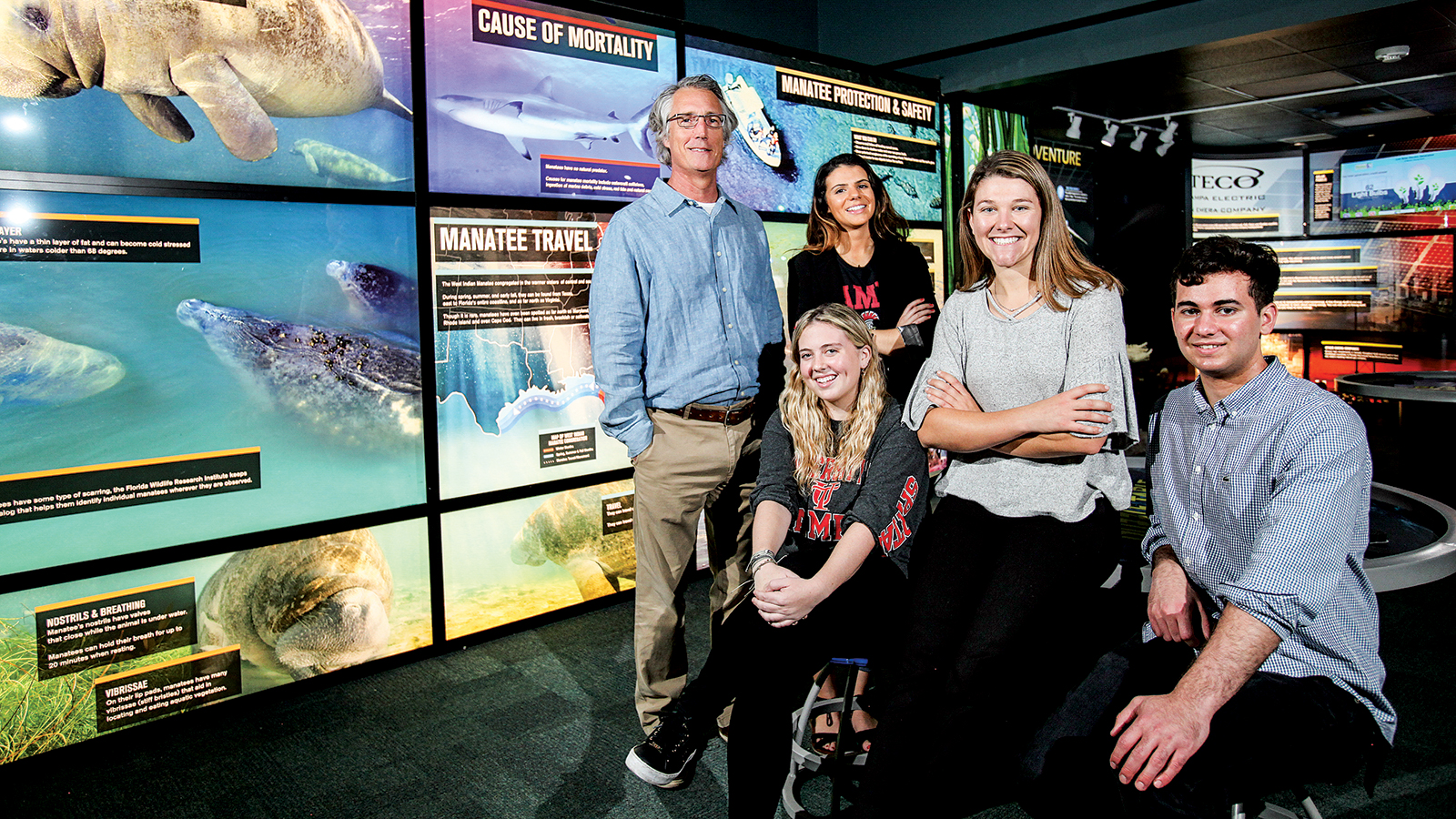Published: September 08, 2020
Lending a Hand
As the COVID-19 pandemic began gripping the globe this past spring semester, many faculty, staff, students and alumni came up with creative – and inspiring – ways to help.
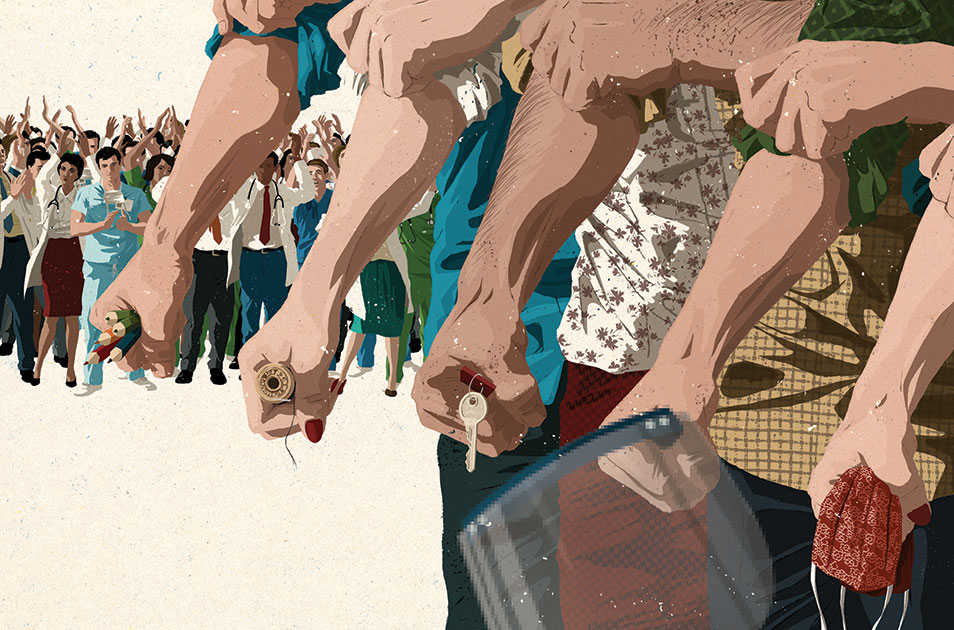
3D Printing Face Shields
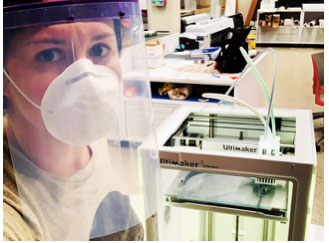
Faculty member Emma Quintana in UT’s Fab Lab
When health care workers in the community faced a shortage of personal protective equipment (PPE), Emma Quintana didn’t panic — she got creative. As the coordinator of UT’s Fab Lab (a workshop equipped with digital fabrication tools for students in the arts to foster innovation), she had an idea.
Using free instructions she’d found online through the global fab lab community, elastic bands, and the lab’s laser cutter and six 3D printers, she made face shields — visors that wrap around the head and include a plastic shield that is long enough to cover health care workers’ faces.
Since mid-March, she has produced more than 3,000 and distributed them to local medical centers such as Johns Hopkins All Children’s Hospital, Moffitt Cancer Center, Tampa General Hospital, AdventHealth Centers and two COVID-19 testing sites — as well as medical providers with high demand in the Bahamas.
To help continue this effort, community partners have stepped up financially, including Citi, which made a $10,000 donation. Another donor is an anonymous member of the UT College of Arts and Letters Advisory Board.
“It’s a way to give back to our real heroes, medical workers,” says Quintana. “The idea that we don’t have to wait for factories abroad to deliver these life-saving objects is pretty incredible.”
A Thread of Hope
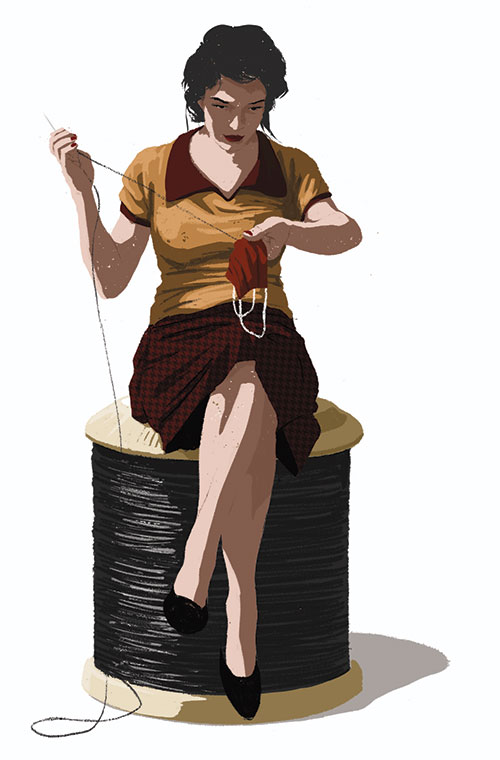
Lisa Hoernlein Culberson ’87, an educational consultant in Tampa, was inspired to spend hours sewing washable, cotton masks whenever she wasn’t working — even though she hadn’t sewed in many years. “I felt like I was doing something that was necessary,” says Culberson. She got a free kit with red and white flower fabric from JOANN Fabrics and Crafts, bought lining and elastic, and then followed the video instructions online. After, Culberson dropped them off at JOANN, which distributed them to a local hospital.
Donating PPE to Those in Need
Also stepping up to the plate were several UT departments, which donated extra PPE that is normally for students and faculty to Tampa General Hospital. Those departments include nursing, physician assistant medicine, biology, chemistry, health sciences and human performance, and art. Health care workers were delighted to receive gear such as surgical masks, isolation gowns, N95 masks, gloves and other items.
Sharing Expertise
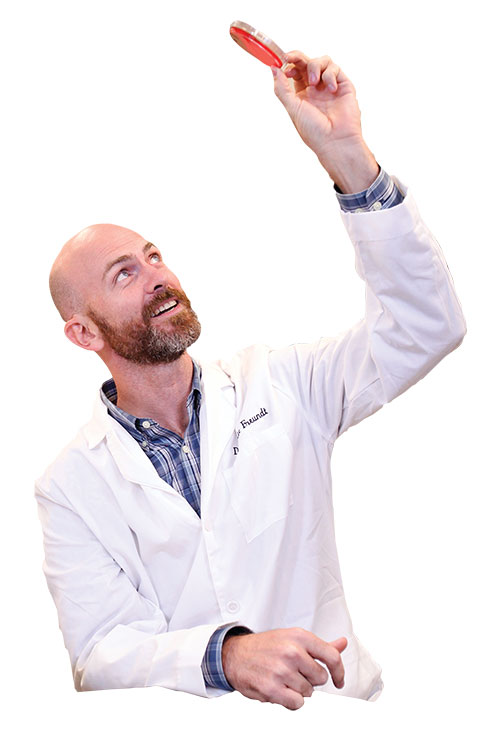
Eric Freundt, director of the Office of Undergraduate Research and Inquiry, has a doctorate in virology.
Eric Freundt, director of the Office of Undergraduate Research and Inquiry, is an expert on viruses. After earning a doctorate in virology from the University of Oxford in England, Freundt was a postdoctoral fellow in the Department of Microbiology and Immunology at Stanford University School of Medicine before arriving at UT. So it’s no surprise that UT has called upon this thought leader during the pandemic.
How have you been helping the UT community stay informed?
I’ve done presentations about COVID-19: one for the UT emergency operations committee, one for first-year students, one for the UT Board of Trustees and two for local Rotary Clubs. I’ve also done media interviews, and I’m one of 20 faculty and staff members on UT’s COVID-19 Health Safety Task Force, which recommends procedures for the safe return of staff, faculty, students and visitors.
One of the viruses you studied was SARS-CoV-1, which causes SARS and is in the same viral family as SARS-CoV-2, the virus that’s now running rampant. How are they different?
With SARS-CoV-1, even though it caused 10% mortality, it only caused about 800 deaths and about 8,000 cases globally — and it was extinguished from the human population solely through public health measures like contact tracing and quarantines. With that virus, you could only transmit it when you were pretty sick. I remember the day that I read that SARS-CoV-2 could be transmitted before (or without) symptoms, and I thought: That’s a game changer. Because that’s what happens with influenza, and that’s one reason it spreads across the globe every year. So SARS-CoV-2 is much better at spreading from person to person than SARS-CoV-1, and that makes containing it through public health measures much more difficult.
What are the best ways to help prevent infection?
The greatest risk is breathing the same air as someone who’s infected. So wearing a mask and keeping your distance are very important. Hand washing and sanitizing surfaces will also help to keep you from becoming infected.
What do you wish more people knew about this pandemic?
This is going to take a united effort. In some people, this virus is not going to be a big deal, but in others, it could be fatal. I hope that in the U.S., we can do the things that are necessary to bring this virus to its knees. And remember that flattening the curve is not all or nothing. There are degrees of social distancing that will flatten the curve but allow you to live your life in a way that’s not too burdensome.
Writing Letters to the Elderly
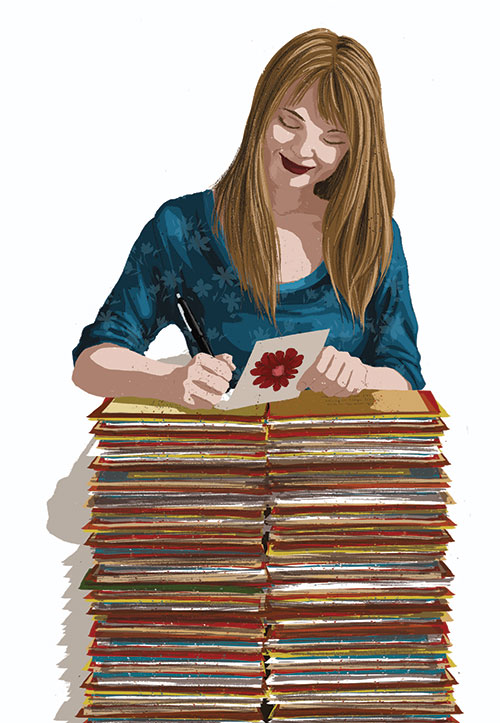
While scrolling through Instagram in March, Jessica Scott ’21 noticed an interesting post from one of her favorite comedians, Heidi Gardner of Saturday Night Live. Gardner had written a card to a senior citizen in a nursing home who had been isolated from family and friends during the pandemic, and she encouraged others to do the same.
Scott, a marketing major, was one of many followers who took her advice to heart. Over the next four weeks, she crafted 101 cards — each containing either a cheerful note, quote or drawing — and mailed 100 of them to strangers in two nursing homes (one card went to her grandmother).
“I know it can be really hard not to be able to see loved ones for long periods of time, especially if you’re used to seeing them every week. I just wanted to make them feel that they weren’t alone, and everyone is in this together,” says Scott. “I wanted the letters to be more than just saying hello. I really wanted to let them know that they were loved and that this will hopefully get better soon.”
When Scott shared her project on Instagram and tagged Gardner, she got an exciting surprise: a private message from her idol that read, “You’re amazing!!!!!! Thank you for doing this. Wow!!!”
Opening His Motel’s Doors
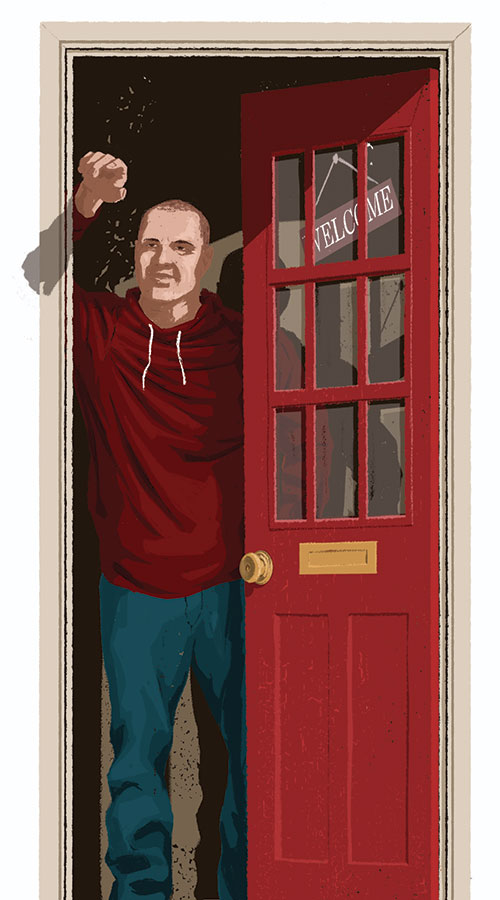
After a couple of decades of working in college counseling and mental health counseling, Kevin Johnson ’82 pivoted to a career that was inspired by being a resident assistant at UT. Since 2002, he’s owned the Gale River Motel and Cottages in Franconia, NH.
During the pandemic, he announced that any local resident with a doctor’s note (explaining that either they have COVID-19 or they live with someone who has COVID-19 and can’t isolate at home) can stay at his motel for free during quarantine. Each room at his motel has a private entrance, and any infected guests are not allowed to use any of the shared outdoor amenities to protect any healthy guests.
“The old adage of ‘Do for others as you wish that they would do for you’ and those types of moral values were ingrained in me from a very early age, and I’ve tried to raise my kids with that philosophy,” says Johnson. “Hopefully what I’ve done is set a standard so that other people can be conscious about going out and doing their little bit. I hope some people hear about this and think, ‘Hey, we could do something too.’”
This isn’t the first time Johnson has thought of others. He’s well known for volunteering on the town’s Water Commission, on the board of directors for a homeless shelter called the Bancroft House, on the board of directors of the Franconia Notch Regional Chamber of Commerce and with Meals on Wheels.
Life as a Quarantine Public Health Officer
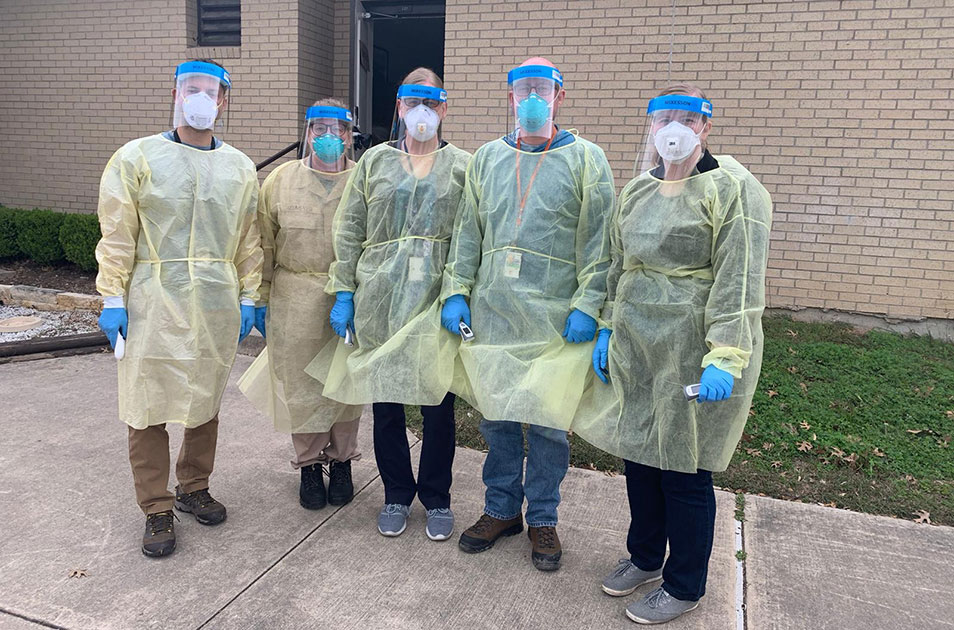
Doug Weigelt ’13 (left) and colleagues in Texas on Feb. 20
“After graduating from UT, I was a public health associate at the Centers for Disease Control and Prevention (CDC) and got a master’s in public health from the University of Pennsylvania. Now I’m a quarantine public health officer for the CDC in Philadelphia.
In January, I set up screening operations at airports in San Francisco and Chicago. We focused on people who were getting off planes from Wuhan, China (where the novel coronavirus originated), and might have COVID-19. I led a team that took their temperature, assessed their risk, gave them educational materials and helped them find medical care if necessary.
In February, the Diamond Princess cruise ship docked in Japan due to a COVID-19 outbreak, and the U.S. government flew American passengers to various U.S. Air Force bases to isolate them. I helped manage the quarantine of the passengers who were sent to Lackland Air Force Base in San Antonio, TX.
They lived in dorms, and we’d visit them twice a day in PPE to do medical evaluations and see what they needed. It became a national news story, and they’d see themselves on their TVs. Many of them were scared and confused, so we spent a lot of time answering questions. Since then, I’ve been back in Philadelphia doing contact tracing.
All in all, it feels like sprinting a marathon. I feel numb, exhausted and frustrated all at once. It’s challenging knowing how overwhelmed our public health systems are. But I’m still hopeful. I hope this pandemic inspires people to work in public health. We live in a world where there are infectious diseases, and they’re not going away. There are still problems to be solved, from the smallest to the largest scale.” – Doug Weigelt ’13
On the Front Lines as an ICU Nurse
“I’m a surgical ICU nurse at Mount Sinai Hospital in New York City, and when NYC became the epicenter of the pandemic in March, we faced a shortage of PPE and had to reuse some of it. I felt apprehensive. My job was caring for the most critically ill COVID-19 patients on my shifts, which run from 7 p.m. to 7 a.m.
At one point, we were so overwhelmed with patients that I was assigned to three, rather than two, and often volunteered to work overtime. Nurses also had to take on extra jobs like taking out the trash and changing linens because it was important to limit the number of workers in each patient’s room.
Most of my patients were on ventilators and, unfortunately, didn’t make it. It was heartbreaking, but I was at least able to make their last moments as comfortable as possible and arrange video chats with their families on the hospital’s tablet.
It was difficult, but there was one beautiful part to all of this: the support. Everyone I knew was calling me to check in. Organizations were coordinating deliveries of food, gifts, money and PPE. If I walked down the street in scrubs, strangers would stop to say thanks. And I got to hear NYC clap and cheer for essential workers every night, which made me feel emotional.
The whole experience has given me a greater sense of gratitude. Every day I get to leave the hospital and go home, I’m thankful.” – Kelly McGann ’18
By Jane Bianchi
Illustrations by Mark Smith

